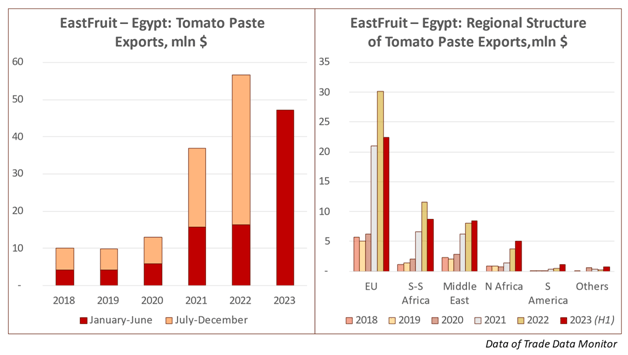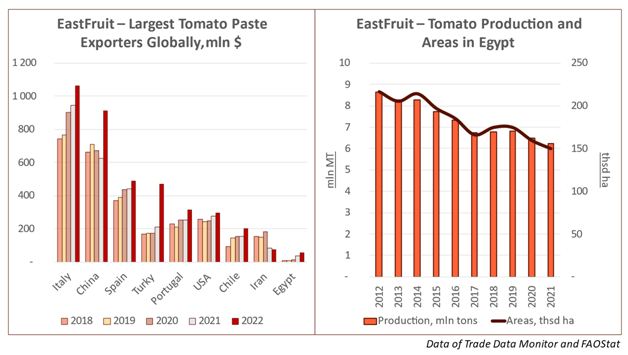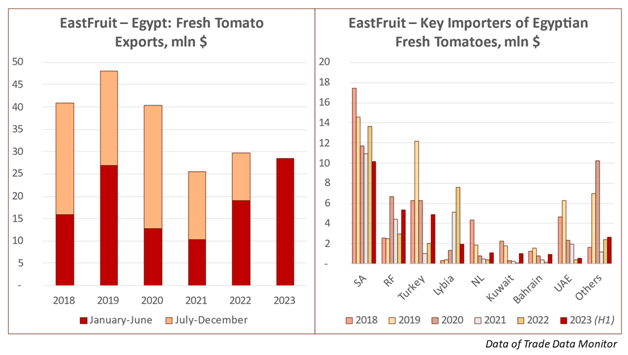Egypt was able to achieve a record revenue from the sale of tomato paste and puree on the global market in 2022, according to EastFruit. Furthermore, the export of Egyptian tomato paste for the first half of this year also rose to a historical maximum. At the same time, the country continues to lose opportunities to increase export revenue in the fresh tomato segment due to structural problems in the industry.

In 2022, Egypt earned $57 million from the export of tomato paste and puree, which 50% higher than the previous year’s figure. Moreover, over the previous five years, revenue from exports of this product has grown almost sixfold! In the same year, Egypt was able to come closest to achieving its 2022 calendar year result in just its first half, with exports reaching $47 million for January-June.
It is worth noting that Egypt is demonstrating rapid growth in tomato paste exports across all key sales directions. Thus, the EU countries remain the main export market for Egyptian processors: over the past five years, revenue from tomato paste supplies from Egypt in this direction has more than quintupled. Previously, Egypt mainly exported tomato paste to Italy, while Poland took its place after five years. By the way, it was Poland that brought Egyptian manufacturers the highest revenue of $10 million among all countries in 2022, and a similar figure was achieved for the first half of this year.
Sub-Saharan Africa is the second most important region for the Egyptian exports. The exports to this region have grown almost 11 times in the last five years, with South Africa, Senegal, and Kenya being the main consumers of this product. In North Africa, Morocco remains the key sales direction ($5 million for January-June 2023), while Jordan is the main export market in the Middle East ($4 million). South America has demonstrated the most rapid growth in importing Egyptian tomato paste in recent years, but its share is still relatively low: exports to Brazil brought Egypt about $1 million for the first half of this year.

Egypt’s rapid growth in tomato paste and puree exports allowed it to rank ninth among the largest exporters of this product in the value terms in 2022. It is worth noting that Egypt had the fastest export growth rate among all top nine countries. For example, from 2018 to 2022, Egypt’s tomato paste exports in US dollars increased 5.6 times, while Turkey’s less then tripled, Chile’s doubled, and other countries’ rose by 15-40%. In Iran (ranked eighth), revenue from tomato paste exports fell by half over the past five years!
There are several factors that have supported such a rapid growth in Egypt’s tomato paste exports in recent years. Firstly, European Union tomato paste processors were forced to deal with serious issues of availability of tomatoes for processing due to severe droughts in 2022-2023. Secondly, due to Russia’s war with Ukraine, the latter was completely excluded from the global market for tomato paste, turning from a net exporter to a net importer. Ukraine was the largest supplier of tomato paste to the Polish market in 2021, accounting for about a quarter of all imports of this product in Poland. After the Russian invasion, other suppliers, including Egypt, began to actively occupy Ukraine’s share.
It is worth noting that tomato paste has maintained its leadership status in terms of export revenue volumes for Egypt’s tomato industry over the past few years and, along with ketchup and tomato sauces, is the largest type of industrial tomato processing. Drying tomatoes (mainly in the sun, not with special equipment) is another method of processing tomatoes in the country. Large players are almost absent in the tomato drying industry, and raw materials are supplied by many small farmers who use this processing method during peak supply periods.
According to the World Processing Tomato Council, Egypt processed almost half a million tons of tomatoes in 2022. However, overall fresh tomato production in the country is rapidly declining. For example, from 2012 to 2021, production in Egypt fell by a third to 6.2 million tons, and areas under this crop decreased by more than a quarter. At the same time, according to various estimates, about 20-30% of all tomatoes grown in the country do not reach their consumers and are lost at various stages of their supply chain. The reason for this is considered to be a lack of modern technologies for growing and processing tomatoes among many industry participants, and this same lack is also causing certain negative trends in the fresh tomato export segment.

On one hand, fresh tomato exports brought Egypt a record $29 million for the first half of this year. On the other hand, exports stagnated in 2021-2022. The reason for such stagnation lies in the regional structure of Egyptian exports. Unlike tomato paste, Egypt mainly focuses on Middle Eastern and Russian markets for fresh tomatoes. Saudi Arabia remains a key export destination for Egyptian tomatoes, accounting for 30-40% of Egypt’s total export revenue annually. Other major importers include Russia, Turkey, Libya, Kuwait, Bahrain, the UAE, and others.
However, only a few of these countries can be called stable tomato importers with a bright prospect of further import growth. For example, the import of premium products to Middle Eastern countries is highly dependent on world oil prices. Turkey is itself a major exporter of tomatoes and imports them only in the event of any catastrophes in the domestic market. Russia is under international sanctions, and civil war continues in Libya. By the way, in 2020, about a quarter of all revenue from tomato exports from Egypt was accounted for by Syria, another country plunged into the horrors of civil war. A year later, Syria was no longer on the list of importers of Egyptian products, which became one of the reasons for the overall decline in fresh tomato exports from Egypt .
In other words, Egyptian tomato exports are based on shipments to those countries that cannot provide a high price for Egyptian products or cannot guarantee such a price over the next few years but are willing to compromise on the quality of the supplied product.
Meanwhile, in the EU market where prices for greenhouse vegetables were hitting records due to an energy crisis in many countries, Egyptian tomatoes were almost absent. The Netherlands was the largest importer of this product from the EU, bringing Egyptian exporters only $1 million for January-June this year, more than five times less than Russia with which there are significant financial and logistical difficulties in trade.
At the same time, Morocco exported tomatoes worth almost $1 billion during the 2022/23 season, with the EU countries being the main buyers of Moroccan tomatoes. In Egypt, there are also examples of more substantial approaches to export development, such as strawberries or sweet potatoes. In fact, at present, there is a serious shortfall in export revenue for all participants in Egypt’s tomato industry except perhaps for tomato paste exporters, at a time when the potential market is actively being conquered by competitors from Morocco.
Tomato growers have no interest or ability to improve the quality of their product since it is mainly supplied to non-premium markets or lower-priced segments. In turn, fresh tomato exporters miss out on the margin they could have counted on when exporting higher-quality products. Moreover, in the future, such an export strategy can lead to losses for tomato paste exporters since the lack of opportunities for profitable work in the fresh market will eventually reduce farmers’ interest in growing tomatoes. This can lead to a decrease in raw produce supply for tomato paste production or a significant increase in its price.
Source: East Fruit

